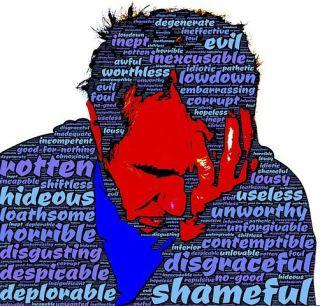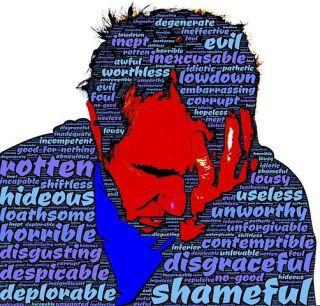Eliminating Guilt, Shame, Regret, and Worry
Curated from: psychologytoday.com
Ideas, facts & insights covering these topics:
9 ideas
·6.35K reads
55
1
Explore the World's Best Ideas
Join today and uncover 100+ curated journeys from 50+ topics. Unlock access to our mobile app with extensive features.
Eliminating Guilt, Shame, Regret, And Worry - Key Points
- Regret and shame often result from feelings of guilt.
- Guilt is a sense of culpability that can be helpful or devastating in one's life.
- When you make a mistake, own it. Correct it if you can, then let it go. Here's how.
64
1.25K reads
It has been said that we are living in an epidemic of social alienation and depression . Cognitive psychologists tell us that depression is often a result of how we interpret the world around us and the role we play in that world. Feelings of guilt, regret, and shame can fuel the fires of depression and further contribute to social withdrawal and alienation. Worry, that is, repetitive concern or rumination, then acts as a catalyst. It may be that a better understanding of what these feelings are and their relationship to one another will help you better control them and even free you from their burden.
55
926 reads
Understanding Guilt, Regret, and Shame
If you read the self-help literature, you will find potentially confusing discussions of guilt, regret, and shame. It seems we have fallen prey to accepting Humpty Dumpty’s assertion “When I use a word…it means just what I choose it to mean neither more nor less.” To clarify the confusion surrounding guilt, regret, and shame, let’s simply rely on denotation to help us clarify and differentiate.
56
763 reads
Guilt, simply said, is a belief in culpability or responsibility for some perceived offense or wrongdoing. There are largely four types of guilt:
- Guilt for doing something you should not have
- Guilt for not doing something you should have
- Guilt by association
- Survivor's guilt (sometimes experienced by accident survivors, survivors of violence, and military members).
54
593 reads
A frequent corollary of guilt is regret. Frankly, regret can be a natural and healthy response to guilt. Regret involves accepting responsibility for some perceived offense or wrongdoing and being remorseful about it. It is often related to thoughts of contrition or repentance and it often leads to subsequent corrective actions and even preventive actions in the future. So regret is not necessarily a bad thing, unless it leads to shame.
54
579 reads
Shame is the angst and distress often associated with guilt. It involves humiliation , a loss of honor or respect. Shame can take stressful regret and turn it into a disaster. Shame is not healthy. It serves no useful purpose.
55
594 reads
Worry
In the early 1990s, Kenneth Smith and I, as well as others, began a research project that has now spanned 30 years. Our initial goal was to discover what factors in the workplace contributed most to psychological burnout and stress-related physical illness. Having collected and analyzed survey data over the course of decades, and using statistical methods such as factor analysis and structural equation modeling, we made a startling discovery.
50
564 reads
We learned that worry (repetitive concern) was a significantly toxic psychological process that was the essence of what we called stress, and was a major determinant of burnout (personal exhaustion). Worry predicted psychological disorders and physical illness. If shame can take regret and turn it into a disaster, worry supercharges that psychological disaster and turns it into a catastrophe, often relentlessly.
58
559 reads
Releasing the Burden
In 1597, Sir Francis Bacon wrote in his Meditationes Sacrae that knowledge itself is power. It influences. It empowers. So how can information help release guilt, regret, shame, and worry?
Understand that guilt, regret, shame, and worry are not four independent stressors, but are often interrelated. They represent a virtual linear cascade that begins with guilt and, like a musical crescendo, builds in intensity and duration, culminating in shame and worry.
53
524 reads
IDEAS CURATED BY
CURATOR'S NOTE
Eliminating Guilt, Shame, Regret, and Worry
“
Tom Joad's ideas are part of this journey:
Learn more about psychology with this collection
How to build a network while working remotely
How to work remotely
How to manage finances while working remotely
Related collections
Similar ideas
11 ideas
Eliminating Guilt, Shame, Regret, and Worry
psychologytoday.com
1 idea
Get Over Guilt with These Steps
healthline.com
8 ideas
Get Over Guilt with These Steps
healthline.com
Read & Learn
20x Faster
without
deepstash
with
deepstash
with
deepstash
Personalized microlearning
—
100+ Learning Journeys
—
Access to 200,000+ ideas
—
Access to the mobile app
—
Unlimited idea saving
—
—
Unlimited history
—
—
Unlimited listening to ideas
—
—
Downloading & offline access
—
—
Supercharge your mind with one idea per day
Enter your email and spend 1 minute every day to learn something new.
I agree to receive email updates

